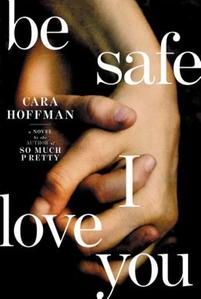
|
|
| photo: Constance Faulk | |
Cara Hoffman's debut novel, So Much Pretty, was based on a murder she covered as a young reporter. She has won awards for her writing, including a New York State Foundation for the Arts Fellowship for her work on the esthetics of violence. Hoffman has been a visiting writer at St. John's, Columbia and Oxford universities. Originally from upstate New York, she lives in Manhattan and teaches writing and literature at Bronx Community College. Her novel Be Safe I Love You (Simon & Schuster, April 1, 2014) centers around a female soldier's return home from Iraq.
On your nightstand now:
Jhumpa Lahiri's The Lowland. It's a brilliant, beautifully structured novel; the way she tells the story of two very different brothers is subtle and perfect. I've also been reading The Coming Insurrection by the Invisible Committee, and a Mozart score for Great Mass in C minor. We're performing it in May with St. George's Choral Society. I've been reading the music before bed in hopes of looking like a badass at choir practice.
Favorite book when you were a child:
It's hard to pick one, but Stuart Little by E.B. White, is just about perfect. As a kid, it made me feel free and brave. But I also loved Tove Jansson's Moomin books, especially Moominland Midwinter, in which the protagonist wanders and plays in a frozen landscape with strange creatures all winter while his family sleeps.
Your top five authors:
Paul Bowles, Flannery O'Connor, Louis-Ferdinand Céline, Joan Didion, David Wojnarowicz.
Book you've faked reading:
I haven't really faked reading. I have sometimes pretended to have not read something so I wouldn't appear too nerdy. For instance, if someone asked me when I was in my 20s if I'd ever read anything by Harlan Ellison, I would've said no. And that is a lie.

Close to the Knives by David Wojnarowicz. It is simply a beautiful, radical, sexy, iconoclastic masterpiece. I've read this book again and again. Wojnarowicz was an artist and writer who died of AIDS in the '90s. The book is written over the period of time when he was diagnosed with the disease. It's part memoir, part fever dream, part manifesto. His descriptions of living on the street and fighting against the institutional powers that are assuring the death of his friends--and the detailed descriptions of everyday life at the time--are gripping. And his prose is lovely. You feel transported. The last several pages of that book, which are about a bullfight, are probably my favorite passages in any work of literature. It's simply transcendent.
Book you've bought for the cover:
Balzac and the Little Chinese Seamstress by Dai Sijie--the hardback first edition, which turned out to be beautifully written. On the cover is a picture of worn red children's shoes with button buckles on them. It's very understated and mysterious and pretty.
Book that changed your life:
Death on the Installment Plan by Louis-Ferdinand Céline. It's in part about Céline's childhood growing up poor in Paris. It's essentially a coming-of-age tale. His work is dark, smart, funny and poignant. He's known as the father of black humor, and I don't think I've ever laughed so hard reading a book (except for maybe Flannery O'Connor's Wise Blood, which was hilarious). But parts of Death on the Installment Plan made me feel like laughing and crying and throwing up all at once. A real triumph to achieve this with just words. It's true what they say about Céline changing the way people write, bringing visceral emotion to literature. The epigraph for Be Safe I Love You is a quote by Céline from Journey to the End of the Night, his novel about returning from combat in World War I.
Favorite line from a book:
I love this line from Wassily Kandinsky: "Everything that is dead quivers. Not only the things of poetry, stars, moon, wood, flowers, but even a white trouser button glittering out of a puddle in the street.... Everything has a secret soul, which is silent more often than it speaks."
Book you most want to read again for the first time:
Joan Didion's Slouching Towards Bethlehem. That book left me with such a sense of possibility and excitement. My mother gave it to me when I was a teenager, and it completely blew me away. I read the entire thing in one sitting. The authority with which she weaves her personal narrative and her personal disintegration with what's happening in America was stunning to me. Her work in so many ways revolves around the power of what's left unsaid. As a prose stylist, she's simply incomparable. I would not have become a journalist if not for reading her work. I'd love to have the feeling of picking up that book again for the first time.

